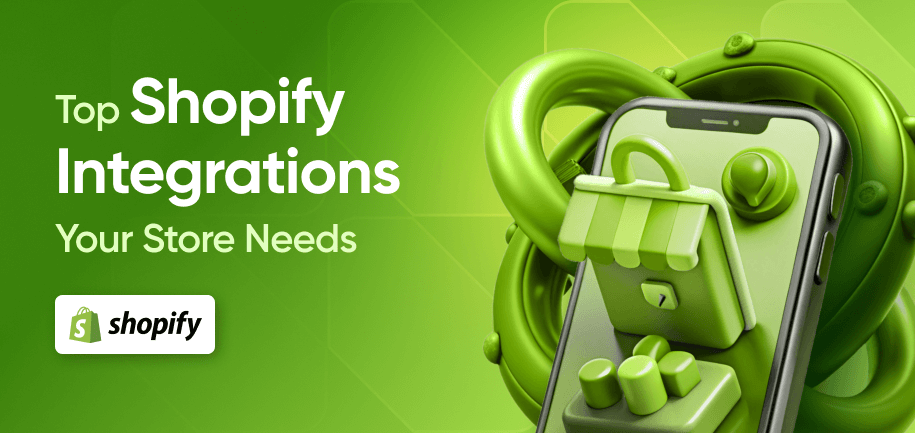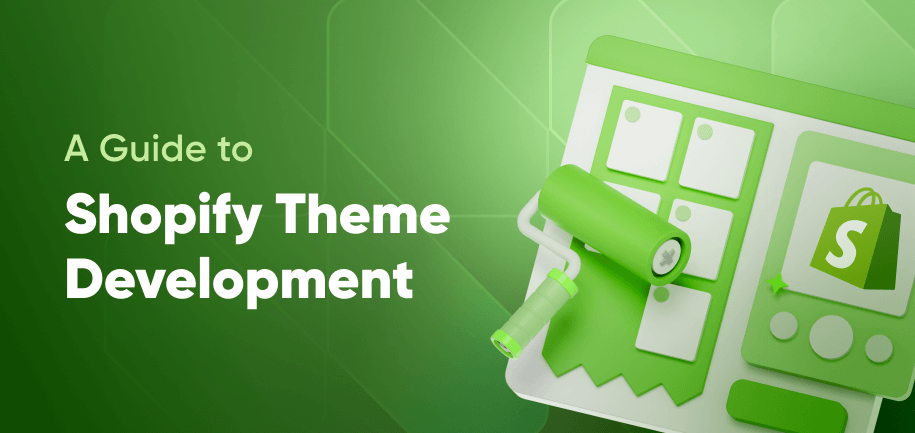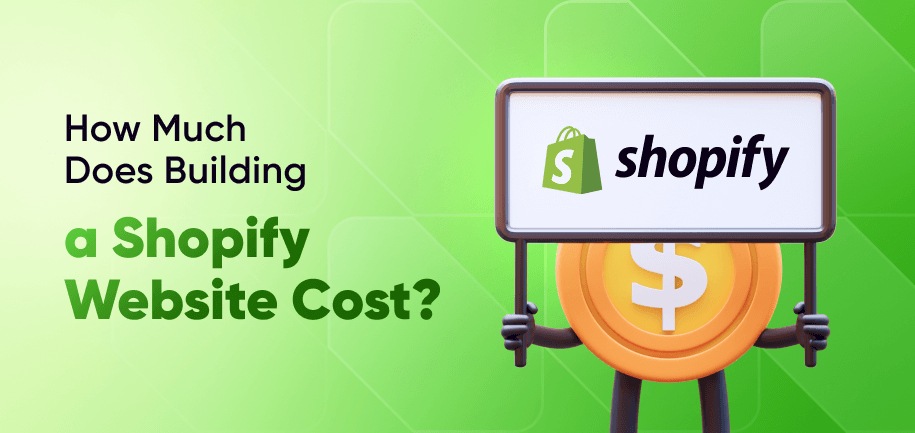Running a successful online store requires more than just a great product. One of the keys to improving customer experience, increasing sales, and streamlining business operations lies in powerful integrations with Shopify. Shopify integrations help automate processes, simplify your workflow, and enhance your store’s functionality. But with so many options available, how do you choose the right ones?
In this post, we’ve put together a comprehensive Shopify integrations list that covers everything you need, from inventory management to marketing, shipping, and customer support. These Shopify integrations are essential for making your store run smoothly and efficiently. Whether you are a new store owner or a seasoned entrepreneur, you will find valuable integrations to supercharge your business.
What Is a Shopify Integration?
A Shopify integration is a process that connects your Shopify store with third-party applications, tools, and services to extend the functionality of your online store. These integrations can help automate tasks, streamline workflows, and enhance your store’s performance by linking Shopify with platforms like payment processors, marketing tools, CRM systems, inventory management software, shipping services, and more.
By integrating Shopify with other platforms, you can optimize your operations, improve the customer experience, and make better business decisions with data from various sources all in one place.
The Advantages and Disadvantages of Shopify Integrations
Advantages:
- Improved Efficiency: By automating tasks like inventory management, order fulfillment, and customer support, Shopify integrations can save you time and effort. This allows you to focus more on growing your business rather than handling routine tasks.
- Enhanced Customer Experience: Integrations like customer support tools, personalized email campaigns, and loyalty programs enable you to provide a better shopping experience. This can lead to increased customer satisfaction, repeat business, and positive reviews.
- Better Data Insights: Many integrations provide powerful analytics and reporting tools that help you track sales, traffic, and marketing performance. Having access to all your data in one place helps you make data-driven decisions.
- Scalability: As your business grows, integrating with new tools and services can help you scale without the need for major infrastructure changes. Whether you want to add a new payment method or launch an affiliate program, integrations allow you to expand your business efficiently.
- Customizability: Shopify integrations let you tailor your online store to suit your business needs. Whether you're looking to offer subscription services, personalized discounts, or improve your checkout process, integrations help you create a unique shopping experience.
Disadvantages:
- Cost: Some Shopify integrations come with additional fees, either as monthly subscriptions or one-time payments. While some apps offer free plans, many advanced features are behind a paywall, which could increase your overall costs.
- Complexity: Adding too many integrations can create a complicated system where managing multiple apps becomes challenging. This can lead to confusion or system crashes if not properly managed, especially if the integrations don’t work well together.
- Technical Issues: Integrations can sometimes cause glitches or downtime, especially when updates or changes are made to the tools or Shopify itself. It’s important to ensure that your integrations are regularly maintained and compatible with each other
- Learning Curve: Some integrations require technical knowledge to set up and use effectively. While many apps are user-friendly, others may require time and expertise to fully harness their potential.
Best Shopify Integrations
Below, we list 25 of the best Shopify integrations, from Oberlo to Stamped.io.
1. Oberlo
For stores that rely on dropshipping, Oberlo is a must-have. This Shopify integration allows you to easily import products from suppliers into your Shopify store and fulfill orders automatically. It’s perfect for entrepreneurs who don’t want to manage inventory and shipping themselves, making it one of the most popular Shopify integrations for dropshipping.
Key Benefits:
- Easily import products from AliExpress and other suppliers.
- Automate order fulfillment and tracking.
- Access to a vast product catalog to find the right items for your store.
2. Klaviyo
Effective email marketing can significantly boost your sales, and Klaviyo is one of the best Shopify integrations for email marketing. It enables you to create targeted email campaigns, automations, and personalized messages that resonate with your customers.
Key Benefits:
- Powerful segmentation and personalization options.
- Automated email flows like abandoned cart emails, welcome series, and post-purchase follow-ups.
- Detailed analytics to optimize email performance.
3. Mailchimp
Although Shopify no longer offers a native Mailchimp integration, there are still ways to use Mailchimp with your store. With the help of third-party apps, you can sync your customer data, segment your audience, and launch automated email campaigns that drive engagement and sales.
Key Benefits:
- Easy-to-use interface with drag-and-drop email design.
- Advanced analytics and reporting.
- A wide range of email templates for any occasion.
4. QuickBooks Online
Managing finances is a crucial part of running an e-commerce business, and QuickBooks Online makes it easier. This integration helps sync your Shopify store’s sales, inventory, and payment data directly with QuickBooks, streamlining your accounting process and reducing the risk of errors.
Key Benefits:
- Sync your orders, taxes, and inventory automatically.
- Easy tax calculations and expense tracking.
- Simplifies bookkeeping and accounting tasks.
5. Yotpo
Yotpo is an excellent integration with Shopify for collecting and displaying product reviews and ratings. It helps increase customer trust and drive conversions by allowing users to leave reviews and ratings directly on your store.
Key Benefits:
- Collect product reviews, ratings, and customer photos.
- Boost social proof and trust with user-generated content.
- Create customizable review widgets and integrations with other marketing tools.
6. Shopify Payments
If you want a seamless and secure payment process for your customers, Shopify Payments is a must-have. It’s the native payment gateway that integrates directly with Shopify and provides support for various payment methods.
Key Benefits:
- Accept credit cards, debit cards, and other payment options.
- No third-party fees when using Shopify Payments.
- Integrated with Shopify’s fraud protection system.
7. Zendesk
When it comes to customer service, Zendesk is one of the best Shopify integrations. This customer support tool helps you manage support tickets, live chat, and email inquiries, ensuring that your customers get quick responses.
Key Benefits:
- Easily track customer interactions and ticket statuses.
- Automate responses and workflows.
- Provide multichannel support across email, chat, and social media.
8. Semrush
SEO is a vital part of online business success, and Semrush is one of the best Shopify integrations to improve your store’s search rankings. This integration helps you analyze your website’s SEO performance, find keywords, and optimize your content to drive more organic traffic.
Key Benefits:
- SEO audit tools to identify on-page issues.
- Keyword research and competitor analysis.
- Track your store’s search rankings and monitor progress.
9. Zapier
Zapier is a powerful tool that allows you to automate workflows by connecting Shopify with thousands of other apps. With this integration, you can create custom workflows to automate tasks such as adding new customers to your email list, sending order information to your CRM, or syncing your inventory with Google Sheets.
Key Benefits:
- Automate repetitive tasks and save time.
- Integrate with over 2,000 apps.
- Create custom workflows with no coding required.
10. ShipStation
Shipping can be one of the most time-consuming aspects of running an e-commerce store. ShipStation is one of the top Shopify integrations to simplify the shipping process by automating label generation, order tracking, and more.
Key Benefits:
- Compare shipping rates from different carriers.
- Generate shipping labels and packing slips.
- Automate order processing and fulfillment.
11. Google Analytics
Integrating Google Analytics with Shopify gives you a deeper understanding of your website traffic, customer behavior, and overall store performance. This data can help you make informed decisions to optimize your sales funnel.
Key Benefits:
- Track website traffic and conversion rates.
- Understand customer demographics and behavior.
- Monitor sales and marketing performance with detailed reports.
12. Privy
Privy is a fantastic Shopify integration for email capture, exit intent popups, and cart abandonment recovery. With Privy, you can increase your email list and recover lost sales through automated campaigns.
Key Benefits:
- Create popups, banners, and flyouts to capture emails.
- Abandoned cart recovery emails to encourage customers to complete their purchase.
- Integration with email marketing tools like Klaviyo and Mailchimp.
13. Shopify POS
If you also run a physical store, Shopify POS (Point of Sale) is one of the best Shopify integrations for synchronizing your online and offline sales. It allows you to track both in-store and online sales, making inventory management and reporting a breeze.
Key Benefits:
- Sync your online and offline stores in real-time.
- Process payments and manage customer profiles at your physical location.
- Track inventory across all sales channels.
14. Bold Commerce
Bold Commerce offers a suite of powerful Shopify integrations that can help you customize your pricing, promotions, and checkout process. This includes tools like Bold Subscriptions, Bold Product Options, and Bold Discounts.
Key Benefits:
- Customize your checkout and product options.
- Offer subscription services and recurring billing.
- Run advanced discounts and promotions.
15. Aftership
With Aftership, you can provide your customers with real-time tracking updates for their shipments. This Shopify integration enhances the post-purchase experience, reducing customer inquiries and improving satisfaction.
Key Benefits:
- Automate tracking updates for customers via email or SMS.
- Track shipments from over 700 carriers.
- Provide branded tracking pages for a seamless experience.
16. Tidio
Live chat is one of the most effective ways to convert visitors into customers. Tidio is a Shopify integration that enables you to add live chat to your store, respond to customer inquiries in real time, and improve customer support.
Key Benefits:
- Add live chat to your store easily.
- Automate responses with chatbot functionality.
- Integrate with email and Messenger for omnichannel support.
17. Gorgias
If you're looking for a customer service solution tailored for Shopify, Gorgias is a great choice. It integrates directly with your Shopify store and allows you to manage customer support tickets, respond to inquiries, and automate repetitive tasks.
Key Benefits:
- Centralized customer support platform.
- Integrates with email, live chat, and social media.
- Automate responses to frequently asked questions.
18. Refersion
For affiliate marketing, Refersion is a standout Shopify integration. It enables you to run your own affiliate program, manage influencers, track referrals, and reward affiliates for driving sales to your store.
Key Benefits:
- Create and manage affiliate programs with ease.
- Track clicks, sales, and commissions.
- Automate affiliate payouts.
19. Smile.io
Loyalty programs are an excellent way to retain customers, and Smile.io is one of the best Shopify integrations for building and managing your loyalty program. This integration allows you to reward customers for their purchases, referrals, and social shares.
Key Benefits:
- Build a customizable loyalty program.
- Offer rewards for referrals and social sharing.
- Increase customer retention with personalized rewards.
20. Shopify Flow
Shopify Flow is a powerful tool that helps you automate tasks and workflows within your Shopify store. It’s perfect for streamlining your processes and saving time on repetitive tasks.
Key Benefits:
- Automate tasks like order fulfillment, inventory management, and customer segmentation.
- Create custom workflows without coding.
- Improve efficiency across all aspects of your business.
21. PushOwl
PushOwl is a Shopify integration that helps you reach customers through push notifications. It’s one of the best ways to increase conversions and re-engage customers who have abandoned their carts.
Key Benefits:
- Send personalized push notifications for abandoned carts, sales, and product launches.
- Engage customers with real-time notifications.
- Increase repeat purchases and sales.
22. Trello
If you manage multiple projects or tasks, Trello can help you stay organized. By integrating Trello with Shopify, you can track your store’s tasks, inventory, and customer support requests in one place.
Key Benefits:
- Create task lists and assign tasks to team members.
- Organize your workflow visually with Trello boards.
- Integrate with other tools like Slack and Google Drive.
23. Shopify Shipping
For store owners who want to simplify their shipping process, Shopify Shipping provides discounted rates on shipping and helps you manage labels, tracking, and deliveries with ease.
Key Benefits:
- Discounted shipping rates with major carriers.
- Print shipping labels directly from your Shopify admin.
- Access real-time tracking and delivery updates.
24. AutoDS
AutoDS is an automation tool for dropshipping businesses. With AutoDS, you can automate the entire dropshipping process, from finding winning products to order fulfillment and tracking.
Key Benefits:
- Automate product sourcing, pricing, and order fulfillment.
- Sync with suppliers and manage inventory in real time.
- Save time with automatic price adjustments and product imports.
25. Stamped.io
Stamped.io helps you collect and display product reviews, ratings, and testimonials. This integration with Shopify is designed to increase trust and conversion rates by allowing customers to see social proof before making a purchase.
Key Benefits:
- Collect reviews, ratings, and photos from customers.
- Boost conversion rates by displaying social proof.
- Easily integrate with email marketing tools.
Conclusion
There you have it, a list of the top 25 Shopify integrations your store needs. These Shopify integrations are essential for streamlining your operations, improving customer experience, and boosting sales. By integrating Shopify with the best tools available, you can automate routine tasks, improve your marketing efforts, and create a better experience for both you and your customers.
Now is the time to choose the Shopify integrations that align with your business needs and start reaping the benefits.
With Amasty’s Shopify integration service, you can streamline your e-commerce operations, reduce manual work, and create a more connected and efficient business environment. Whether you are looking for a simple integration or a complex, custom solution, Amasty is equipped to provide the tools and expertise necessary to step up your Shopify store.
Frequently asked questions
You can integrate Shopify with a wide variety of stores, whether you run an online store, a brick-and-mortar shop, or both. Shopify integrates with platforms like Amazon, eBay, and Etsy, as well as many shipping carriers, CRM systems, and marketing tools. Whether you’re looking for a solution for inventory management, customer service, or accounting, Shopify’s flexibility allows you to connect with many different types of stores and services.
The best carrier for Shopify depends on your specific needs and location. Shopify integrates with several popular carriers such as USPS, UPS, FedEx, DHL, and Canada Post. Shopify Shipping offers discounted rates and allows you to compare prices from different carriers to find the most cost-effective option for your business. Additionally, third-party apps like ShipStation and Aftership can help you manage shipping with more carriers and offer additional features like automated tracking and label generation.
Yes, Shopify integrates with many other platforms. It has built-in integrations with tools for accounting (QuickBooks), email marketing (Klaviyo, Mailchimp), customer service (Zendesk, Gorgias), social media, and much more. Additionally, through third-party apps and APIs, Shopify can be connected with a wide range of platforms to meet the specific needs of your business. These integrations allow for streamlined operations and enhanced functionalities to help you grow your store.



















